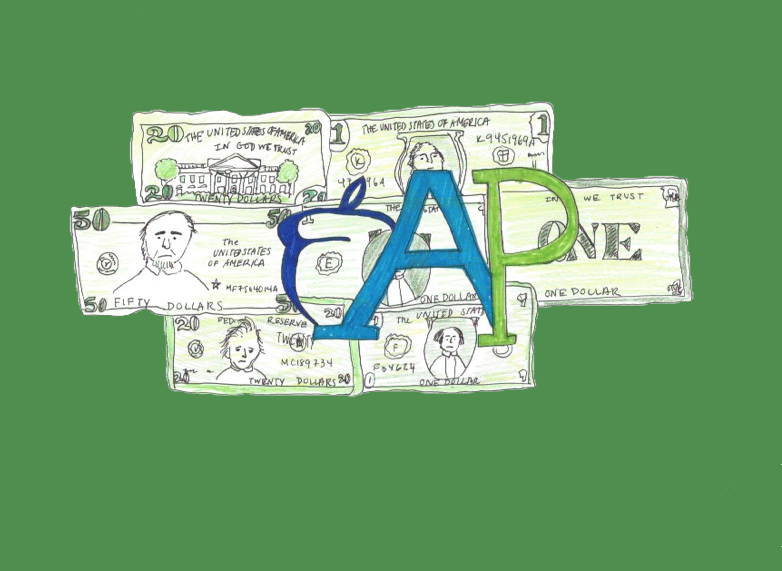Each May, hundreds of thousands, some years even millions, of high schoolers in the United States and Canada take the College Board’s AP exams. After preparing diligently in their rigorous classes for months, these students are tasked with a short amount of time, ranging from one hour and thirty minutes to three hours and fifteen minutes depending on the test, to show what they have learned throughout the school year. If they do exceptionally well, some of these students can submit their scores to colleges in exchange for higher course placement and credit. Enticing as they may be, the benefits of these exams come at a price, literally. With families spending hundreds of dollars a year on several tests, the question is: Are AP Tests too expensive?
The AP program dates back to the 1950s during the Cold War. It was created out of fear that American teenagers were being insufficiently prepared for their collegiate and adult lives, and in order to beat the Soviets, a superior education for the future generations was needed. The first nationwide AP exams were administered in 1956, consisting of Math, Physics, Chemistry, Biology, English Composition, Literature, Spanish, French, Latin, and German. Back then, the cost was a mere ten dollars for any number of tests. The fee has risen greatly over the past few decades, typically going up by one or two dollars a year. In 2019, the cost for just one exam is ninety four dollars in the US and one hundred and twenty four dollars in Canada. The College Board offers financial aid for students in need, which currently sits at thirty two dollars, but adjusts as the price increases.
So yes, the costs of these tests are in fact steep, but are they unreasonable? Are they just small expedidentures to pay for a long term gain? Ninety four dollars seems unreasonable for any kind of test, especially when many high schools, like Ridgewood, mandate their students enrolled in AP courses take the exams in order to receive AP credit. When students take two or more AP classes a year, they are obliged to shell out hundreds of dollars to essentially boost their GPA. Also, while financial aid is available to students with low income backgrounds, the maximum reduction is only thirty two dollars, meaning they still have to pay sixty two dollars per exam. Is this really that substantial of a discount? Not to mention, only one test is administered for each subject. Receiving a bad score is equivalent to throwing all that money down the drain.
On the other hand, AP exams are a bargain. At most universities in North America, students who score a three or above on their AP exams are eligible for credit. That ninety four dollar price tag may seem ridiculous, but in context, it is more affordable than paying hundreds of dollars for a single class (the average cost of a college credit is $594). Additionally, students scoring threes, fours, and fives can enter higher level courses as freshman. This can open more doors to possible majors and allow them to challenge themselves academically.
Ridgewood may be a well-off town, but that doesn’t mean the students are unbothered by paying the fees for AP exams. Payton Angus, a junior at RHS taking AP Psychology and AP Physics thinks that the exams are “way too expensive.” Michael Rego, also a junior, is currently enrolled in AP Government & Politics and agrees with Ms. Angus’ statement. Even RHS faculty think the cost is too much. Mrs. Kalebic, an AP Psychology teacher at RHS, thinks that the fees for AP exams are “definitely high” and should be lowered.
The college admissions process is undoubtedly expensive, with no guarantee of admission. Most colleges want to see that students have taken AP courses and sat for the tests. In addition, standardized tests and therefore preparation is necessary to succeed. Taking the SAT, which is also College Board facilitated like AP exams, or the ACT multiple times is also encouraged by schools. There are also school-specific application fees that students pay through the Common Application when submitting applications. “I felt like I was just paying to get rejected,” said an anonymous senior student. Is applying to college all just a money game? Students have to pay hundreds of dollars to prepare for standardized tests, the actual test-taking fee, pay for AP examinations, and the school application fee all before actually getting accepted to college. Once in college, the majority of students will have to take out student loans in order to pay for school. Most students will agree that their hard work was worth it, but in light of the recent USC admissions scandal, the money that goes into college applications is something to think about.
Regardless of complaints, AP exams will continue to get more expensive as the number of test takers rises. Applying to college gets more and more competitive each year as the number of students who will want to take and do well on AP examinations will continue to grow. Good luck to all RHS students taking one or more AP exam this school year!
Correction: The April print issue of this article (Volume LXXXV No. 3) attributed the graphic to the incorrect person. The correct illustrator is Amelia Chen.
James Ellinghaus
staff writer
Graphic: Amelia Chen


Cool stuff, but you didn’t answer the question. It’s like if I asked you “Why is an apple red?” and you replied “It’s red.” So why has it actually gone up in price over time?